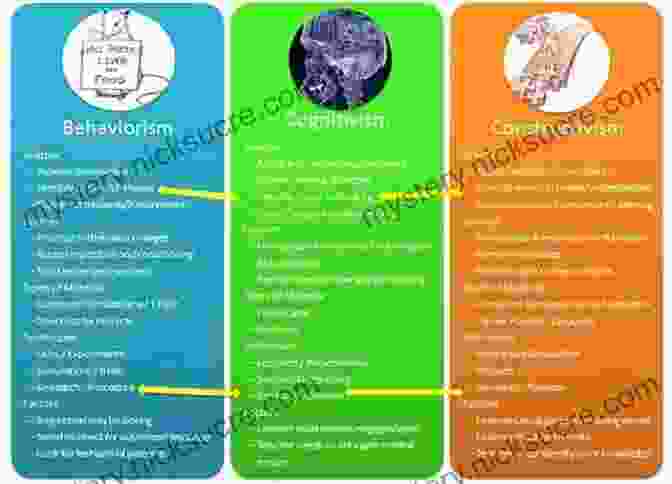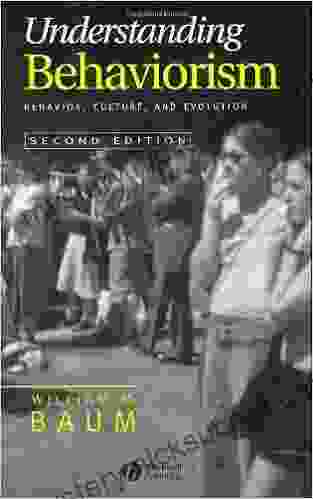Understanding Behaviorism: Behavior, Culture, and Evolution


Behaviorism is a school of psychology that focuses on the objective study of observable behavior. Behaviorists believe that behavior is learned through conditioning, and that it can be changed through reinforcement and punishment. Behaviorism has been used to explain a wide range of human behaviors, from simple reflexes to complex social interactions.
4.5 out of 5
| Language | : | English |
| File size | : | 3239 KB |
| Text-to-Speech | : | Enabled |
| Screen Reader | : | Supported |
| Word Wise | : | Enabled |
| Print length | : | 312 pages |
| Lending | : | Enabled |
Culture is a system of shared beliefs, values, and practices that is passed down from one generation to the next. Culture influences our behavior in many ways, from the way we dress to the way we eat. It can also affect our thoughts and feelings.
Evolution is the process by which organisms adapt to their environment. Evolution can occur through natural selection, which is the process by which organisms with traits that are better suited to their environment are more likely to survive and reproduce.
Behaviorism, culture, and evolution are all interconnected. Behavior is influenced by culture, and culture is influenced by evolution. Evolution can also lead to changes in behavior.
Behaviorism
Behaviorism was founded by John B. Watson in the early 20th century. Watson believed that psychology should be a science, and that it should focus on the objective study of observable behavior. He rejected the idea that mental processes could be studied scientifically, and he argued that all behavior is learned.
Watson's theory of behaviorism was based on the work of Ivan Pavlov, a Russian physiologist who studied the conditioned reflex. Pavlov showed that dogs could be conditioned to salivate in response to the sound of a bell. Watson believed that all behavior, including human behavior, could be conditioned in the same way.
Watson's theory of behaviorism was very influential in the early 20th century. It led to the development of new methods for studying behavior, and it helped to establish psychology as a science. However, Watson's theory was also criticized for being too simplistic. Critics argued that it ignored the role of mental processes in behavior.
Culture
Culture is a system of shared beliefs, values, and practices that is passed down from one generation to the next. Culture influences our behavior in many ways, from the way we dress to the way we eat. It can also affect our thoughts and feelings.
Culture is learned through socialization, which is the process by which we learn the values and norms of our society. Socialization begins in childhood, and it continues throughout our lives. We learn about our culture from our parents, our teachers, our peers, and the media.
Culture is not static. It changes over time as new ideas and technologies are introduced. Culture can also change as a result of contact with other cultures.
Evolution
Evolution is the process by which organisms adapt to their environment. Evolution occurs through natural selection, which is the process by which organisms with traits that are better suited to their environment are more likely to survive and reproduce.
Natural selection can lead to changes in behavior. For example, a study of guppies in Trinidad found that guppies that lived in streams with predators were more likely to be shy and to avoid open water than guppies that lived in streams without predators. This suggests that shyness and avoidance of open water are traits that are favored by natural selection in environments with predators.
The Interconnection of Behaviorism, Culture, and Evolution
Behaviorism, culture, and evolution are all interconnected. Behavior is influenced by culture, and culture is influenced by evolution. Evolution can also lead to changes in behavior.
For example, the development of agriculture led to changes in human behavior. Before agriculture, humans were hunter-gatherers. They lived in small groups and they moved from place to place in search of food. After the development of agriculture, humans began to live in settled communities. They grew their own food, and they began to develop new technologies. These changes in culture led to changes in human behavior. For example, humans became more sedentary, and they began to develop new skills and knowledge.
The interconnection of behaviorism, culture, and evolution is a complex and fascinating topic. It is a topic that has been studied by scholars for centuries, and it is a topic that continues to be studied today.
Behaviorism, culture, and evolution are all important factors that influence human behavior. Behaviorism is the study of observable behavior, culture is the system of shared beliefs, values, and practices that is passed down from one generation to the next, and evolution is the process by which organisms adapt to their environment. These three factors are interconnected, and they all play a role in shaping human behavior.
4.5 out of 5
| Language | : | English |
| File size | : | 3239 KB |
| Text-to-Speech | : | Enabled |
| Screen Reader | : | Supported |
| Word Wise | : | Enabled |
| Print length | : | 312 pages |
| Lending | : | Enabled |
Do you want to contribute by writing guest posts on this blog?
Please contact us and send us a resume of previous articles that you have written.
 Fiction
Fiction Non Fiction
Non Fiction Romance
Romance Mystery
Mystery Thriller
Thriller SciFi
SciFi Fantasy
Fantasy Horror
Horror Biography
Biography Selfhelp
Selfhelp Business
Business History
History Classics
Classics Poetry
Poetry Childrens
Childrens Young Adult
Young Adult Educational
Educational Cooking
Cooking Travel
Travel Lifestyle
Lifestyle Spirituality
Spirituality Health
Health Fitness
Fitness Technology
Technology Science
Science Arts
Arts Crafts
Crafts DIY
DIY Gardening
Gardening Petcare
Petcare Chris Pountney
Chris Pountney Joanne Kimes
Joanne Kimes Michael Gurian
Michael Gurian Don Allen Jr
Don Allen Jr Eugenia G Kelman
Eugenia G Kelman Joseph Correa
Joseph Correa Peter Bodo
Peter Bodo Dian Olson Belanger
Dian Olson Belanger Linda Rosenkrantz
Linda Rosenkrantz Nicholas Tomalin
Nicholas Tomalin Norman Thelwell
Norman Thelwell Craig Martelle
Craig Martelle Chris Morton
Chris Morton Phil Williams
Phil Williams Elizabeth Laing Thompson
Elizabeth Laing Thompson Stephen King
Stephen King Jasmine Shao
Jasmine Shao Paige Powers
Paige Powers Dennis Adler
Dennis Adler Richard Drake
Richard Drake Douglas P Fry
Douglas P Fry Tamara Ferguson
Tamara Ferguson David Martin
David Martin Jessica Howard
Jessica Howard Jared Diamond
Jared Diamond Nigel Cawthorne
Nigel Cawthorne Chad Eastham
Chad Eastham Sara Gaviria
Sara Gaviria Maren Stoffels
Maren Stoffels Douglas Preston
Douglas Preston Maxine A Goldman
Maxine A Goldman Mona Bijjani
Mona Bijjani Robert Garland
Robert Garland Upton Sinclair
Upton Sinclair Jill Angie
Jill Angie Helen Zuman
Helen Zuman Lew Freedman
Lew Freedman Sarah Prager
Sarah Prager Mary C Townsend
Mary C Townsend Lisa Feldman Barrett
Lisa Feldman Barrett Caitlyn Dare
Caitlyn Dare E Ink Utilizer
E Ink Utilizer Melissa Mullamphy
Melissa Mullamphy Skip Lockwood
Skip Lockwood Susan Orlean
Susan Orlean Earl G Williams
Earl G Williams Eric P Lane
Eric P Lane Joanne V Hickey
Joanne V Hickey Aaron Reed
Aaron Reed Pat Rigsby
Pat Rigsby Judith Merkle Riley
Judith Merkle Riley Chris Bonington
Chris Bonington William Wood
William Wood Kelly Rowland
Kelly Rowland Mcgraw Hill
Mcgraw Hill Jeff Belanger
Jeff Belanger Dr Monika Chopra
Dr Monika Chopra Silvia Dunn
Silvia Dunn Thomas Achatz
Thomas Achatz Marcia Scheiner
Marcia Scheiner Caleb J Tzilkowski
Caleb J Tzilkowski Kaplan Test Prep
Kaplan Test Prep Steven Kerry Brown
Steven Kerry Brown James Miller
James Miller Charles Sanger
Charles Sanger Ivy Hope
Ivy Hope Bruce Van Brunt
Bruce Van Brunt Heather Balogh Rochfort
Heather Balogh Rochfort Tony E Adams
Tony E Adams Hecateus Apuliensis
Hecateus Apuliensis Max Lucado
Max Lucado Nicola S Dorrington
Nicola S Dorrington Sarah Berman
Sarah Berman Roger Marshall
Roger Marshall Sheila A Sorrentino
Sheila A Sorrentino Jim Wiese
Jim Wiese Matt Baglio
Matt Baglio Victoria Honeybourne
Victoria Honeybourne Carrie Hope Fletcher
Carrie Hope Fletcher Emt Basic Exam Prep Team
Emt Basic Exam Prep Team Maha Alkurdi
Maha Alkurdi Max Lugavere
Max Lugavere Sarah Baker
Sarah Baker Carole Bouchard
Carole Bouchard Shyima Hall
Shyima Hall Nawuth Keat
Nawuth Keat Ned Feehally
Ned Feehally Wilhelm Reich
Wilhelm Reich David Savedge
David Savedge Sallyann Beresford
Sallyann Beresford Larry Larsen
Larry Larsen Katie Fallon
Katie Fallon Richard Harding Davis
Richard Harding Davis J R Harris
J R Harris R Scott Thornton
R Scott Thornton Destiny S Harris
Destiny S Harris Celeste Headlee
Celeste Headlee Lauren Manoy
Lauren Manoy Ian Tuhovsky
Ian Tuhovsky Marc Bona
Marc Bona Brandy Colbert
Brandy Colbert Sammy Franco
Sammy Franco Dounya Awada
Dounya Awada Shaunti Feldhahn
Shaunti Feldhahn Jess J James
Jess J James Emma Warren
Emma Warren Dave Bosanko
Dave Bosanko George Daniel
George Daniel Nedu
Nedu Bunmi Laditan
Bunmi Laditan Jennifer Appel
Jennifer Appel Rand Cardwell
Rand Cardwell Matt Price
Matt Price Sue Elvis
Sue Elvis Martina Mcbride
Martina Mcbride Lewis Kirkham
Lewis Kirkham Ashley Christensen
Ashley Christensen Terry Laughlin
Terry Laughlin David Wilber
David Wilber Simon A Rego
Simon A Rego Vincent Chidindu Asogwa
Vincent Chidindu Asogwa Jason Runkel Sperling
Jason Runkel Sperling Ron Rapoport
Ron Rapoport Michael A Tompkins
Michael A Tompkins R L Medina
R L Medina Charles Salzberg
Charles Salzberg Db King
Db King Paul A Offit
Paul A Offit Ed Housewright
Ed Housewright Jim Kempton
Jim Kempton Shelby Hailstone Law
Shelby Hailstone Law Melanie Anne Phillips
Melanie Anne Phillips Craig Callender
Craig Callender Lina K Lapina
Lina K Lapina Jimmy Chin
Jimmy Chin Lily Field
Lily Field Olivier Doleuze
Olivier Doleuze Cameron Mcwhirter
Cameron Mcwhirter The Atavist
The Atavist Stian Christophersen
Stian Christophersen Mike X Cohen
Mike X Cohen Richard Henry Dana
Richard Henry Dana Suzanne Young
Suzanne Young Dave Rearick
Dave Rearick Philippe Karl
Philippe Karl Philip Purser Hallard
Philip Purser Hallard Lucy Cooke
Lucy Cooke David Nathan Fuller
David Nathan Fuller Declan Lyons
Declan Lyons Dory Willer
Dory Willer Thomas Carothers
Thomas Carothers Joyceen S Boyle
Joyceen S Boyle Dick Hannula
Dick Hannula Robert A Cutietta
Robert A Cutietta John Kretschmer
John Kretschmer Jeffrey L Kohanek
Jeffrey L Kohanek Ronald T Potter Efron
Ronald T Potter Efron Romola Anderson
Romola Anderson Dina Nayeri
Dina Nayeri Winky Lewis
Winky Lewis Nick Tumminello
Nick Tumminello Luc Mehl
Luc Mehl Byron L Reeder
Byron L Reeder Buddy Levy
Buddy Levy Leslie R Schover
Leslie R Schover Robert Edward Grant
Robert Edward Grant John H Falk
John H Falk Richard C Francis
Richard C Francis Shmuel Goldberg
Shmuel Goldberg Sophie D Coe
Sophie D Coe Carmen Davenport
Carmen Davenport Julietta Suzuki
Julietta Suzuki David Tanis
David Tanis Thomas Deetjen
Thomas Deetjen Richard Bullivant
Richard Bullivant Jacob Erez
Jacob Erez Kerry H Cheever
Kerry H Cheever Phil Bourque
Phil Bourque C J Archer
C J Archer Warwick Deeping
Warwick Deeping Ronit Irshai
Ronit Irshai Edward Humes
Edward Humes Guy Grieve
Guy Grieve Nicolas Bergeron
Nicolas Bergeron Daniel Prince
Daniel Prince Tricia Levenseller
Tricia Levenseller Michael Mewshaw
Michael Mewshaw Elizabeth Anne Wood
Elizabeth Anne Wood Erin Beaty
Erin Beaty Winslow Tudor
Winslow Tudor David Eagleman
David Eagleman Pamela Weintraub
Pamela Weintraub Francis Glebas
Francis Glebas Creek Stewart
Creek Stewart Wyatt Mcspadden
Wyatt Mcspadden Dianne Maroney
Dianne Maroney Oliver Sacks
Oliver Sacks Sarah Jacoby
Sarah Jacoby John M Marzluff
John M Marzluff Bryce Carlson
Bryce Carlson Katherine D Kinzler
Katherine D Kinzler James W Anderson
James W Anderson Gary Mayes
Gary Mayes Nick Gamis
Nick Gamis Scott Hartshorn
Scott Hartshorn Donna R Causey
Donna R Causey Leon Speroff
Leon Speroff Healthfit Publishing
Healthfit Publishing Michael Chatfield
Michael Chatfield Michael Lear Hynson
Michael Lear Hynson Michael D Alessio
Michael D Alessio Pia Nilsson
Pia Nilsson Marco Wenisch
Marco Wenisch Sarah Ockwell Smith
Sarah Ockwell Smith Jack Disbrow Gunther
Jack Disbrow Gunther Lee Alan Dugatkin
Lee Alan Dugatkin Veronica Eden
Veronica Eden Roger J Davies
Roger J Davies Sam Priestley
Sam Priestley Dan Flores
Dan Flores Kyra Phillips
Kyra Phillips Neville Goddard
Neville Goddard Charles Staley
Charles Staley Trevelyan
Trevelyan Natasha Daniels
Natasha Daniels Doug Cook
Doug Cook Bryan Litz
Bryan Litz Ken Sande
Ken Sande Marc Van Den Bergh
Marc Van Den Bergh Kevin A Morrison
Kevin A Morrison Richard W Voelz
Richard W Voelz Justin Coulson
Justin Coulson John Jamieson
John Jamieson Mark Stanton
Mark Stanton Martin Davies
Martin Davies Stephen Harrison
Stephen Harrison Tyler Trent
Tyler Trent Elaine Tyler May
Elaine Tyler May Michelle Travis
Michelle Travis Eric R Dodge
Eric R Dodge William Ellet
William Ellet Lottie Bildirici
Lottie Bildirici Michael Blastland
Michael Blastland Troy Horne
Troy Horne Duncan Steel
Duncan Steel Heather Jacobson
Heather Jacobson Ron Senyor
Ron Senyor Susan Garcia
Susan Garcia Kevin Houston
Kevin Houston C F Crist
C F Crist Valerie Poore
Valerie Poore Arrl Inc
Arrl Inc Charu C Aggarwal
Charu C Aggarwal Dorothy Canfield Fisher
Dorothy Canfield Fisher Frederick Jackson Turner
Frederick Jackson Turner James Goi Jr
James Goi Jr Megan Miller
Megan Miller Vladimir Lossky
Vladimir Lossky Cecil B Hartley
Cecil B Hartley William M Baum
William M Baum Oprah Winfrey
Oprah Winfrey Freya Pickard
Freya Pickard C M Carney
C M Carney Tim S Grover
Tim S Grover Mathew Orton
Mathew Orton Jennifer L Scott
Jennifer L Scott Scott Mactavish
Scott Mactavish Joe Baker
Joe Baker Jamie Marich
Jamie Marich Barbara Acello
Barbara Acello Bruce W Harris
Bruce W Harris Peterson S
Peterson S Robert D Gibbons
Robert D Gibbons Vivian Foster
Vivian Foster Carol Inskipp
Carol Inskipp Lily Raff Mccaulou
Lily Raff Mccaulou Leah Hazard
Leah Hazard Scarlett V Clark
Scarlett V Clark Joel Best
Joel Best Janet Evans
Janet Evans Michael Tan
Michael Tan Pam Flowers
Pam Flowers Natasha Ngan
Natasha Ngan James Beard
James Beard Stacey Rourke
Stacey Rourke Fern Schumer Chapman
Fern Schumer Chapman W D Wetherell
W D Wetherell Donna Goldberg
Donna Goldberg Darcy Lever
Darcy Lever Carrie Marie Bratley
Carrie Marie Bratley Orangepen Publications
Orangepen Publications Karen J Rooney
Karen J Rooney John Burroughs
John Burroughs Pedro Urvi
Pedro Urvi Bruce Maxwell
Bruce Maxwell Kevin Howell
Kevin Howell Lisa Hopp
Lisa Hopp Kacen Callender
Kacen Callender Robert Larrison
Robert Larrison Steve Barrett
Steve Barrett Marisa Peer
Marisa Peer Joseph Moss
Joseph Moss Fiona Beddall
Fiona Beddall Christine Mari Inzer
Christine Mari Inzer J D Williams
J D Williams Kruti Joshi
Kruti Joshi Cathy Glass
Cathy Glass Samantha De Senna Fernandes
Samantha De Senna Fernandes Gary Lewis
Gary Lewis Tibor Rutar
Tibor Rutar C S Lewis
C S Lewis Ivan Gridin
Ivan Gridin Niels H Lauersen
Niels H Lauersen Ira K Wolf
Ira K Wolf Peter J D Adamo
Peter J D Adamo Martha Finley
Martha Finley John R Mabry
John R Mabry Tom Bass
Tom Bass Trevor Thomas
Trevor Thomas Bruce Sutherland
Bruce Sutherland Matt Mullenix
Matt Mullenix Sylvia Williams Dabney
Sylvia Williams Dabney Tim Glover
Tim Glover Denise May Levenick
Denise May Levenick Ransom Riggs
Ransom Riggs Sherri L Jackson
Sherri L Jackson Leslie A Sams
Leslie A Sams Jonathan T Gilliam
Jonathan T Gilliam Helen Webster
Helen Webster Thomas Daniels
Thomas Daniels Cassandra Mack
Cassandra Mack Rowena Bennett
Rowena Bennett Elena Paige
Elena Paige Tom Cunliffe
Tom Cunliffe K C Cole
K C Cole Paul Rabinow
Paul Rabinow Issai Chozanshi
Issai Chozanshi S M Kingdom
S M Kingdom Jim Al Khalili
Jim Al Khalili Paul Lobo
Paul Lobo Nikki Carroll
Nikki Carroll Clement Salvadori
Clement Salvadori Maria Van Noord
Maria Van Noord Albert Rutherford
Albert Rutherford Jessica Holsman
Jessica Holsman Kindle Edition
Kindle Edition Malika Grayson
Malika Grayson Elmer Keith
Elmer Keith Mark Stavish
Mark Stavish Zachery Knowles
Zachery Knowles John Vince
John Vince Scott Cawthon
Scott Cawthon Sheri Morehouse
Sheri Morehouse Meriwether Lewis
Meriwether Lewis Paul Murdin
Paul Murdin Katharine Mcgee
Katharine Mcgee Graham Norton
Graham Norton Kevin Panetta
Kevin Panetta Narain Moorjani
Narain Moorjani Elizabeth May
Elizabeth May Jack Canfield
Jack Canfield Max Prasac
Max Prasac Erin Macy
Erin Macy Susan Frederick Gray
Susan Frederick Gray Fmg Publications Special Edition
Fmg Publications Special Edition Robert Moor
Robert Moor Steven W Dulan
Steven W Dulan Melissa A Priblo Chapman
Melissa A Priblo Chapman Matthew Marchon
Matthew Marchon Ashley Eckstein
Ashley Eckstein Tim Freke
Tim Freke Law School Admission Council
Law School Admission Council Kendall Rose
Kendall Rose J R Rain
J R Rain Lingo Mastery
Lingo Mastery Dvora Meyers
Dvora Meyers Richard Barrett
Richard Barrett Meghan Daum
Meghan Daum Kathy Woods
Kathy Woods Martina D Antiochia
Martina D Antiochia Hugh Aldersey Williams
Hugh Aldersey Williams Lee Jackson
Lee Jackson John Flanagan
John Flanagan Ken Schwaber
Ken Schwaber Kat Davis
Kat Davis Jane Brocket
Jane Brocket Sandra Niche
Sandra Niche Lsat Unplugged
Lsat Unplugged Theodora Papatheodorou
Theodora Papatheodorou Laurie Notaro
Laurie Notaro Lynette Noni
Lynette Noni Nicola Yoon
Nicola Yoon Meg Cabot
Meg Cabot Carlos I Calle
Carlos I Calle Huberta Wiertsema
Huberta Wiertsema J Maarten Troost
J Maarten Troost Cornelia Pelzer Elwood
Cornelia Pelzer Elwood Dr Tommy John
Dr Tommy John Henry Malone
Henry Malone L W Jacobs
L W Jacobs David Cannon
David Cannon Rick Trickett
Rick Trickett Om Krishna Uprety
Om Krishna Uprety Deirdre V Lovecky
Deirdre V Lovecky Rob Pate
Rob Pate William Ian Miller
William Ian Miller Shawna Richer
Shawna Richer Cal Newport
Cal Newport Jim West
Jim West Mark Young
Mark Young Scott Mcmillion
Scott Mcmillion Leah Zani
Leah Zani Caroline Manta
Caroline Manta John Moren
John Moren Julie Golob
Julie Golob Steve Guest
Steve Guest Maurice J Thompson
Maurice J Thompson Stella Cottrell
Stella Cottrell Ian Leslie
Ian Leslie Tey Meadow
Tey Meadow Collins Easy Learning
Collins Easy Learning Matthew Warner Osborn
Matthew Warner Osborn William Rathje
William Rathje John H Cunningham
John H Cunningham M E Brines
M E Brines Tanya Hackney
Tanya Hackney Ralph Galeano
Ralph Galeano Jeff Scheetz
Jeff Scheetz Bruce Watt
Bruce Watt Albert Jeremiah Beveridge
Albert Jeremiah Beveridge Frank Muir
Frank Muir Dan Romanchik Kb6nu
Dan Romanchik Kb6nu Jennifer Rose
Jennifer Rose Hibiki Yamazaki
Hibiki Yamazaki Emily Lowry
Emily Lowry Sterling Test Prep
Sterling Test Prep Matt Racine
Matt Racine Kathleen Flinn
Kathleen Flinn Mary Pagones
Mary Pagones Tina Schindler
Tina Schindler Stedman Graham
Stedman Graham Jim Warnock
Jim Warnock Mark Hansen
Mark Hansen Greg W Prince
Greg W Prince Tyler Burt
Tyler Burt Don S Lemons
Don S Lemons Mo Gawdat
Mo Gawdat Rita Golden Gelman
Rita Golden Gelman Jen Howver
Jen Howver Jim Supica
Jim Supica Julia Ann Clayton
Julia Ann Clayton Graham Hancock
Graham Hancock Emily Writes
Emily Writes Sonia Shah
Sonia Shah Keith Brewer
Keith Brewer Shea Ernshaw
Shea Ernshaw Diane Lindsey Reeves
Diane Lindsey Reeves Konstantinos Mylonas
Konstantinos Mylonas Ruthellen Josselson
Ruthellen Josselson E W Barton Wright
E W Barton Wright Jesse Romero
Jesse Romero William L Sullivan
William L Sullivan Lianna Marie
Lianna Marie Sophie Messager
Sophie Messager Valliappa Lakshmanan
Valliappa Lakshmanan Veronica Roth
Veronica Roth John Grehan
John Grehan Elisabeth Elliot
Elisabeth Elliot Nick Littlehales
Nick Littlehales Ivar Dedekam
Ivar Dedekam Rebecca Musser
Rebecca Musser Elizabeth Dupart
Elizabeth Dupart Lynn Butler Kisber
Lynn Butler Kisber Gregory A Kompes
Gregory A Kompes Robert Walker
Robert Walker John J Ratey
John J Ratey Wayne Coffey
Wayne Coffey Della Ata Khoury
Della Ata Khoury Marla Taviano
Marla Taviano Howard E Mccurdy
Howard E Mccurdy Simon Michael Prior
Simon Michael Prior Lois Lowry
Lois Lowry Anthony Camera
Anthony Camera
Light bulbAdvertise smarter! Our strategic ad space ensures maximum exposure. Reserve your spot today!
 Kazuo IshiguroFollow ·2.2k
Kazuo IshiguroFollow ·2.2k Johnny TurnerFollow ·11k
Johnny TurnerFollow ·11k Nathaniel PowellFollow ·12.7k
Nathaniel PowellFollow ·12.7k Elias MitchellFollow ·2.3k
Elias MitchellFollow ·2.3k Willie BlairFollow ·8.7k
Willie BlairFollow ·8.7k Ralph EllisonFollow ·3.7k
Ralph EllisonFollow ·3.7k Kirk HayesFollow ·15.3k
Kirk HayesFollow ·15.3k Ernest HemingwayFollow ·8.8k
Ernest HemingwayFollow ·8.8k

 Henry David Thoreau
Henry David ThoreauHow To Bake In Unique Way: Unleash Your Culinary...
Baking is an art form that transcends the...

 F. Scott Fitzgerald
F. Scott FitzgeraldAcademic Magic: Unveil the Secrets of The Last Magus
Delve into a Realm of...

 John Green
John GreenThe Digitally Agile Researcher in UK Higher Education:...
In the rapidly...

 George Orwell
George OrwellZinc: Sources And Significance To Human Health
Zinc, an essential trace mineral, plays a...

 Mario Simmons
Mario SimmonsToo Scared to Tell: A Harrowing and Thought-Provoking...
In the realm...
4.5 out of 5
| Language | : | English |
| File size | : | 3239 KB |
| Text-to-Speech | : | Enabled |
| Screen Reader | : | Supported |
| Word Wise | : | Enabled |
| Print length | : | 312 pages |
| Lending | : | Enabled |














